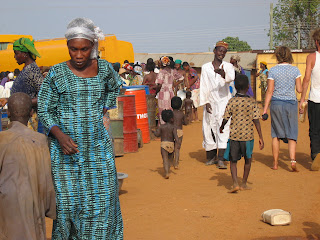Our first group to Ghana leaves a week from tomorrow! We are excited to hear how their trip will go. In the meantime, I'll post an exerpt from the book I'm writing. Perhaps our volunteers will become a part of this very scene.
"I close my eyes, sometimes, when I’m alone, and call up pictures in my mind of my favorite places in Ghana. Kotokuraba market. I see a flurry of color and motion, of heat and noise. Set in the center triangle created by three crossing streets, it is a place of commerce, confusion, and commotion. Taxis, tro tros, and a few private cars crowd the streets around it. Both taxis and tro tros, or small vans, function as mini buses, with people crammed in with their goods and the occasional goat. Across from the market is the “station,” where I would take a tro tro every day to the orphanage. Dozens of little VW vans crowded the area, all painted to proclaim the driver’s belief in Jesus. “The Lord will provide,” or “Gye Nyame”—except for God. Apparently, this proclaimed belief precluded a need for seatbelts. The drivers stood near their tros, calling out their destination. “Takoradi, Takoradi,” and “Jukwa Jukwa Jukwa Jukwa Jukwa!” Women and children wandered around, adding their own voices, like that of so many birds, proclaiming the wares atop their heads—water, bread, cookies. “Aeeees water,” “paaaanoo,” and “beeescuits!” One man marched through the area daily, holding an umbrella over his head that dangled with handkerchiefs of numerous colors and designs. Set in a large circle, surrounded by shops and flocking with hawkers, and only one way in or out, the station became a joyful place for me.
I became a common fixture there as well, a part of the pulsing mobs. After taking a taxi from my house to town, I “dropped” at Kotokuraba and found whoever was proclaiming “Jukwa!” that day. I always took a moment to buy “pure water” from one of the ladies or girls. Though it came in a plastic sachet like “ice water,” pure water was purified, its bag carefully sealed in a bloated square, and stamped with blue ink. I stuffed a few in my dirtier-by-the-day backpack and climbed aboard the tro tro. Somewhere between two and thirty minutes later, the tro pulled out—they only left when they were full. The ride took me through Cape Coast and into the suburb of Adisadel, then past Pedu Junction and to Abura, the suburb where my host’s sister, Mama Joyce, lived. After Abura came scattered jungle, a secluded hotel on a small crocodile pond called Hans Cottage, past the barren earth where women crushed rocks under small thatched shelters, and on to the tiny hamlet of Ansapatu—just short of the larger village of Efutu.
I called to the mate, the young boy who took passenger’s money, and the tro tro stopped. People in the aisle seats stood to fold their seats up and step out so I could crouch past, then piled back in again and headed on up to the town of Jukwa. I turned to Ansapatu, which consisted of a few small houses, a tiny shop, a school, and New Life International Orphanage. Smiling and waving at the women who sat among the enormous pile of greenish-yellow oranges they were selling, I headed down the red dirt hill, anxious to get to my children.
The orphanage was across the little lane from the orange and brown government junior secondary school (JSS), set nearly at the edge of the rainforest. It was painted a bland white with blue trim, and an unfinished three-room schoolhouse hunched next to it. A small orange tree stood near the front gate to the left, a palm tree further down. The refuse pile and laundry lines sat away from the school, near the large, overgrown area referred to as the garden. The cement basins where the children bathed were farther away, near the bushes where the “bathroom” was—a large pit crossed with wooden beams. A rickety wooden fence made a pitiful attempt to keep the goats out of the garden, and a painted sign declared it to be “New Life International Orphanage Home/School for orphaned, abandoned, and needy children.”"
Copyright Shallee M. 2008









 Ready to leave Accra for Cape Coast.
Ready to leave Accra for Cape Coast. Hanging with the monkeys at Boabeng Fiema Monkey Forest.
Hanging with the monkeys at Boabeng Fiema Monkey Forest. Saying goodbye to Green Turtle Lodge.
Saying goodbye to Green Turtle Lodge.
.jpg) Last day at Sankofa with David and a few of the teachers and kids.
Last day at Sankofa with David and a few of the teachers and kids.







 Sons of Drumming
Sons of Drumming










 View from the playground-- the school building. To the right is the dining area and home.
View from the playground-- the school building. To the right is the dining area and home. Drumming Time!
Drumming Time! Danny and Patrick, two of our volunteers, helping the kids prepare the bamboo for building.
Danny and Patrick, two of our volunteers, helping the kids prepare the bamboo for building.
 Shallee and her husband Danny with David.
Shallee and her husband Danny with David.

















